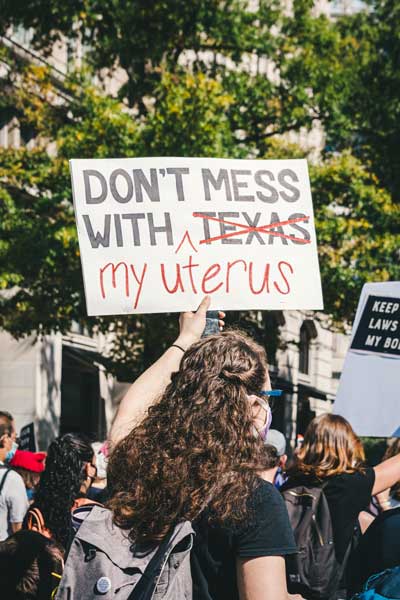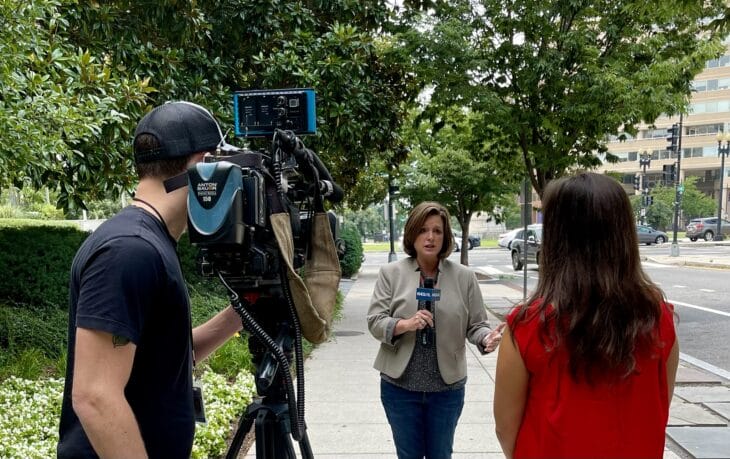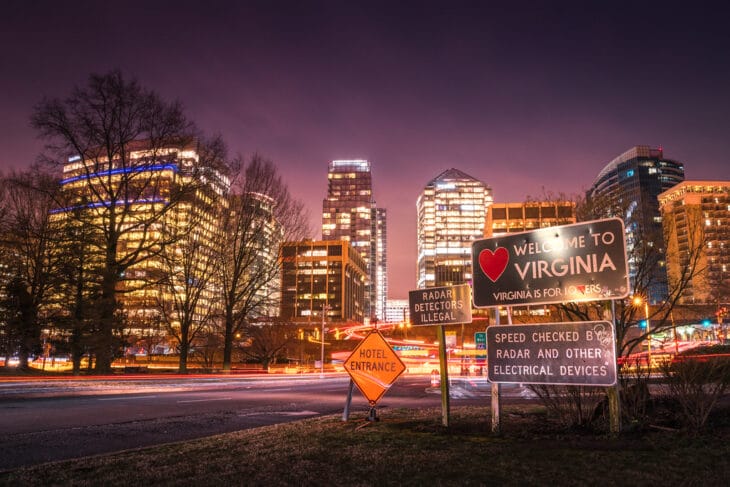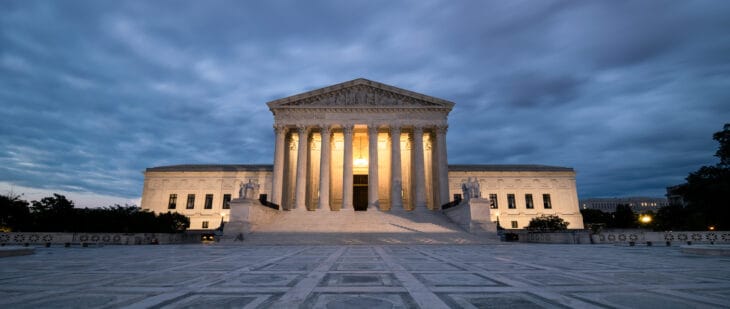
Abortion Today, Birth Control Tomorrow
The assault on Women’s reproductive rights won’t stop at abortion, birth control is next. State legislatures matter.
We are outraged.
Last night, in a truly unprecedented event, a draft decision on the Dobbs v. JacksonSupreme Court case was leaked to the public. If that opinion becomes final, it will strike down Roe v. Wade and set back fundamental rights in this country by half a century.
While the leak was unexpected, the decision itself is not. The GOP has been intent on eviscerating federal civil rights protections and regressing the country to an era of forced birth for decades – and they’ve been doing it by strategically building power at the state level.
If Roe is overturned, the battle over the future of reproductive freedom will go to the states – especially the 23 states where abortion will be effectively banned. That list includes four of our 2022 target states: Arizona, Michigan, Georgia, and Wisconsin.
At Sister District, we are more resolved than ever to fight to protect access to abortion care and reproductive justice for all our communities.
Abortion will soon become inaccessible in nearly half the country, and communities of color, LGBTQ communities, low-income, and working class communities will be disproportionately affected. The only way to stop this attack on our bodies is state by state.
We are angry. We are resolute. And we know that we must stay focused. The right to an abortion will be determined by state legislators in all fifty states, and it has never been more urgent to elect pro-choice state legislators. Thank you for standing with us.
In solidarity,
The Sister District Team
The news of the Supreme Court’s imminent ruling to strike down Roe v. Wade, while completely unsurprising, has still sent shock waves through me – a feeling I’m certain many of you share. As a woman, a mother, a daughter, a sister… I am feeling heartbroken and furious watching our country take this devastating step backward.
Without the protections of Roe, the right to choose in Pennsylvania will now fall into the hands of our extremist GOP majority. Reproductive freedom will now be on the ballot with stakes higher than they’ve been in a generation. Now is not the time to lay down and lick our wounds, but the time to stand together and speak loudly and clearly: ABORTION IS ESSENTIAL HEALTHCARE.
Everyone deserves the freedom to make choices about their bodies and their lives. Being a passive supporter of choice will no longer be enough. We must demand that our leaders do all in their power to protect access to safe and affordable abortion for ALL women and families across our commonwealth and our country.
I vow to take the pain and anger that I feel at this moment and use it to push me forward on this path to #flipthe151 and the entire PA House. I will fight with every ounce of energy I have to protect and defend reproductive freedom in Pennsylvania. Originally posted here.
When I heard last night about the leaked draft of the Supreme Court opinion which appeared to show that the court will vote to overturn Roe v. Wade, I was dismayed but not shocked.
The right-wing has for years been chipping away at abortion rights in state legislatures across the country and stuffing our courts with justices who want to overturn a legal precedent that was decided almost 50 years ago.
If the Supreme Court overturns Roe v. Wade, the battle over a woman’s right to choose will be fought at the state level. As of now, 26 states have plans to move to ban or restrict abortion. The next Governor of Pennsylvania will play a critical role in keeping the commonwealth a place where women’s rights are respected.
I firmly believe in a woman’s right to choose and vehemently oppose government control over this decision, and that’s why I have fought and will continue to fight against bills that would roll back reproductive rights in PA.Originally posted here.
In late 2021, the conservative-majority Supreme Court began hearing oral arguments for Dobbs v. Jackson Women’s Health, a case that is widely expected to reverse the precedent set by Roe v. Wade (1973).
If Roe is effectively overturned, access to safe and legal abortion will be almost exclusively left in the hands of state legislatures – setting reproductive rights back nearly 50 years. In many Republican-controlled states, voter suppression tactics has diluted the ability of voters to enact state policy that reflect their views on abortion care. According to Pew Research, the majority of Americans are in favor of keeping abortion access legal in all or most cases.

In 1973, Roe v. Wade ruled that state abortion bans and laws that significantly interfered with a person’s ability to access an abortion before viability (around 24-weeks of pregnancy), are unconstitutional. In other words, Roe established the legal precedent for first trimester abortion rights, but it didn’t enshrine abortion access into federal law.
The Court’s decision was later reaffirmed in Planned Parenthood v. Casey in 1992, and again in Stenberg v. Carhart in 2000. However, the anti-choice movement and their conservative allies have persisted in their ideological crusade to control women’s bodies and reproductive choices.
When Justice Ruth Bader Ginsburg passed away in late 2020, former President Trump and the Republican-controlled Congress replaced her with an outspoken critic of abortion: Justice Amy Coney Barrett. Justice Barrett’s confirmation cemented a nearly unbreakable conservative majority within the Supreme Court.
With the Supreme Court secured, the anti-choice movement has leveled up its assault against reproductive rights at the state level, introducing more than 500 bills in the last year.
In the summer of 2022, the Court will announce its decision on Dobbs v. Jackson Women’s Health, where it will decide the constitutionality of Mississippi’s 15-week abortion ban. If the ban is upheld, the precedent set by Roe and Casey would be effectively nullified, allowing Republican-led state legislatures to institute complete abortion bans without exceptions for rape, incest, medical need, or abuse victims.
That’s why progressive representation within state legislatures is vital to protecting abortion access and bodily autonomy.

From the time Roe was decided in 1973 to June 2021, more than 1,313 restrictions were placed on abortion procedures. But conservative state legislatures kicked into high gear in 2021, introducing more restrictions and barriers than ever.
2021 was the “worst legislative year ever for US abortion rights.” 2022 is on track to beat that record. This is a “5-alarm fire” that requires all of us taking action and working together to extinguish.
2021 saw more than 600 anti-choice bills being advanced in 48 states and 90 restrictive bills in 26 states going into effect thus far; more than any year since Roe v. Wade was decided in 1973.
Between January and May 5th, 2022, 1,991 provisions regarding reproductive healthcare were introduced in 46 states and the District of Columbia. Of this, only 243 provisions aimed to protect or expand reproductive rights in left-leaning states; California, New Jersey, and Colorado.
The great majority, 1,748, sought to degrade reproductive rights or worse, criminalize individuals trying to access or provide reproductive care and abortion care. Prohibition of reproductive healthcare, criminalization of a right we’ve exercised for more than 50 years, and state-sponsored vigilantes; this is the future we leave for ourselves and the next generation if we don’t stand now and take action.
#Roe has been established law to to protect the right to private healthcare decisions, free from government overreach. If #SCOTUS overturns it, Arizonans will be in danger. A pro-choice AZ Senate can protect women’s rights.
Please also go find Pro-Choice Candidates to support. Your help with donations, and your help with reaching out to voters is absolutely necessary to push back against this kind of throwback to terrible times. Originally posted here.
So many of our mothers, including my own @CharleneforAZ worked to ensure women would make their own health care decisions. No person should control the body of another. This fight is not over, not by a long shot. Originally posted here.
Texas has become the latest poster child for near-total abortion bans, after SB-8 went into effect in September 2021.
Republican Governor Gregg Abbott, a longtime Trump ally, pushed hard for SB-8. The law bans abortions as early as 5 weeks; before most people know they are pregnant.
The law allows any private citizen in any state to sue anyone who helps a woman obtain an abortion for a settlement up to $10,000, effectively putting a bounty on providers and those who provide support. Anti-choice organizations even set up reporting hotlines and websites in hopes of funneling complaints to the courts to shut down abortion services indefinitely.
The expected onslaught of litigation against abortion providers and staff is expected, and designed, to shut down every provider in the state. Doing so would force people in need of care to nearby states, increasing the distance they need to travel for care by nearly 20 times – from an average of 12 miles one way, to an average distance of 248 miles one way.
The added distance creates significant geographical and financial barriers due to the increase in cost for travel and care, disproportionately impacting marginalized and low-income communities who cannot afford the financial cost or travel time.
After nearly a month of being in effect, a federal district court judge blocked SB-8 from being enforced, only to be reinstated soon after. Unfortunately, the law is written such that if the law is suspended, anyone who performs or aids an abortion can still be retroactively sued once the law is back in place.
However, even anti-choice advocates are concerned that the law’s tricky methods of enforcement could be used to degrade other rights.

Jackson Women’s Health is the only abortion provider in the state of Mississippi, meaning some people must travel more than four hours each way to visit the facility. In addition to long travel distances, Republican lawmakers in the state mandated two separate office visits for an initial “information session” that must include misleading, scientifically unproven claims regarding the procedure to scare patients, followed by a 24-hour waiting period before the procedure can proceed.
Effectively, the lack of providers plus the 24-hour waiting period means that patients must either live nearby, be able to afford overnight accommodations and time off, or be able to make the drive multiple times before the deadline. These restrictions disproportionately affect people of color and low-income communities.
In addition to being one of the most hostile states toward abortion rights, Mississippi is home to the upcoming Supreme Court case that will determine the future of abortion access in the country; Dobbs v. Jackson Women’s Health. The case will determine if the state’s 15-week abortion ban, which has already been struck down by lower courts, is constitutional. If the conservative Supreme Court ignores all legal precedent and scientific evidence to side with Mississippi’s abortion ban, it would effectively overturn Roe v. Wade and open the floodgates for even more restrictive state laws and total bans throughout the nation, even in instances of rape and abuse.
In 2021, the Tennessee state legislature made it legal for medical providers to withhold medical information from a patient about her pregnancy if the provider suspects she might get an abortion. The state’s ultra-conservative Governor Bill Lee was signed SB-1370, which also defined personhood as starting at “fertilization,” setting the stage for abortion to be legally on par with criminal homicide, while also robbing women of the ability to trust medical providers or make fully informed decisions that impact their health, economic stability, and future.
Governor Lee, who was endorsed by President Trump, also signed HB-1181, which requires fetal tissue to be buried or cremated, thereby increasing the cost and burden to both women in need of service and providers with an additional $150-$350 per procedure. Lee’s fellow party members in the state legislature also introduced SB-0494, which allows men, including rapists and abusers, to legally block a person from obtaining an abortion, without any legal requirement for the man stopping the abortion to provide financial, medical, or child support.
So-called “trigger laws” are a tactic deployed by the GOP to preemptively ban abortions at the state level. The laws mean that if Roe is overturned, a ban on abortion would automatically “trigger,” or go into effect.
Alabama, Arizona, Arkansas, Michigan, Mississippi, Oklahoma, West Virginia, Wisconsin
Arkansas, Idaho, Kentucky, Louisiana, Mississippi, Missouri, North Dakota, Oklahoma, South Dakota, Tennessee, Texas, Utah
Alabama, Arkansas, Georgia, Kentucky, Mississippi, Missouri, Ohio, South Carolina, Tennessee
4 states have state constitutional amendments that explicitly state they do not protect nor secure rights to abortion:
TRAP laws, or targeted regulation of abortion providers, are medically unnecessary requirements placed on abortion providers under the guise of protecting women’s health. The true aim of these bills is to shut down legal providers of abortion by regulating them out of business.
For example, Republican-led states often require abortion providers to have hospital admittance privileges to nearby hospitals, which requires the doctor to admit a certain number of patients to the hospital for care every year to maintain those privileges. However, a legal abortion performed by medical providers has been proven to be an extremely safe procedure, with complications being so rare that providers are often unable to meet the minimum patient admittance to maintain their hospital privileges.
Because abortion providers also often provide related reproductive healthcare services like family planning tools, birth control, and STI testing, fewer clinics mean less access to those services as well, often disproportionately impacting communities of color.
Republican lawmakers claim that TRAP laws are aimed at protecting the safety and health of women, flying in the face of scientific evidence that abortion is twice as safe as getting a penicillin shot and nearly 14 times safer than giving birth.
As of July 2021, 45 new TRAP bills have been introduced with 14 enacted in Republican-majority legislatures.
Examples of TRAP tactics:
In 2019, the Journal of Women’s Health published a study that looked into the distances women traveled to access abortion services. They found that more than 1 in 5 women traveled 50+ miles each way to obtain an abortion, with the majority citing it as the closest provider available to them.
Additionally, white college-educated women who live outside of metro areas were most likely to travel farthest, highlighting the barriers and lack of options faced by low-income women of color in obtaining abortion care.
Being forced to carry an unwanted pregnancy is a greater risk to one’s health than the abortion procedure itself, with women of color are at greater risk of pregnancy-related complications and death. According to the CDC, maternal mortality rates have been steadily increasing since the 1980s, with a rate of 17.3 deaths per 100,000 as of 2017. Of those deaths, an astounding 42% were Black or African American women and 28% were Indigenous women, accounting for more than 70% of all maternal deaths.
With the potential for Roe to be overturned, progressive state leaders have been passing bills actively protecting abortion access.
12 States and D.C. protect a person’s right to an abortion:
After flipping the state legislature in 2019, Virginia Democrats passed the Reproductive Health Protection Act, which effectively overturned two decades of anti-choice and TRAP laws that created medically unnecessary barriers to reproductive care, including abortion.
People in Virginia are now able to access safe, legal abortion care in one visit, without mandatory waiting periods, biased counseling, or medically unnecessary tests or ultrasounds. By removing unnecessary waiting periods and unnecessary tests, the financial barriers that disproportionately prevent low-income women from receiving abortion care were removed.

Known as progressive havens, Oregon and Vermont both protected reproductive rights and abortion access by enacting a Freedom of Choice Act. The law protects access to first-trimester abortions even if Roe is overturned.
The states both expanded access to abortion care by allowing more medical providers, such as nurse practitioners, to offer services. To further reduce the financial barriers that disproportionately prevent marginalized women from accessing care, both states also provide support services for low-income individuals.
In 2018, Washington State passed the Reproductive Parity Act in an effort to protect reproductive rights, including abortion, as well as work to reduce financial barriers to care. The act required health insurance companies to cover all FDA-approved birth control methods, rather than allowing businesses to decide what contraception they would cover which did not account for individual medical needs. It also requires that maternity care include access and coverage of abortion procedures.
Even in GOP-controlled states, progressive representatives are fighting back and making meaningful strides.
During a 2013 special legislative session in Texas, the Republican-dominated legislature was blocked from passing an omnibus anti-abortion bill filled with TRAP laws that would have shut down nearly all the abortion providers in the state. Democratic State Senators filibustered the bill for 13 hours straight, with Sen. Wendy Davis filibustering for nearly all of that time. A record in Texas until August 12th of 2021, when Democratic Senator Carol Alvarado filibustered a voter suppression bill for 15 hours straight.

The assault on Women’s reproductive rights won’t stop at abortion, birth control is next. State legislatures matter.

Representative Ann Johnson joins Sister District Executive Director Lala Wu to discuss what’s at stake in Texas and why she chose to be one of the leading voices in the Texas walkout.

In just two years, Virginia’s Democratic trifecta, led by Sister District alums has created a sea change in the state. Read on to learn about the progressive legislation going into effect on July 1st, 2021!

With a conservative majority on the Supreme Court, there is a very real possibility Roe v. Wade will be struck down. Learn what’s at stake for protecting access to reproductive healthcare in Virginia and throughout the country.

We’ve always known that a conservative-majority Supreme Court would threaten abortion rights. Still, we know that state legislators have power, for good and for ill.

In 2019, after years of hard and strategic organizing work, Democrats finally won control of both chambers of the Virginia General Assembly for the first time in nearly a quarter of a century. Read on to see what they’ve done in 2020.
Last updated May 9th, 2022

Checks can be sent to:
Sister District Project
440 North Barranca Avenue, #8737
Covina, California 91723